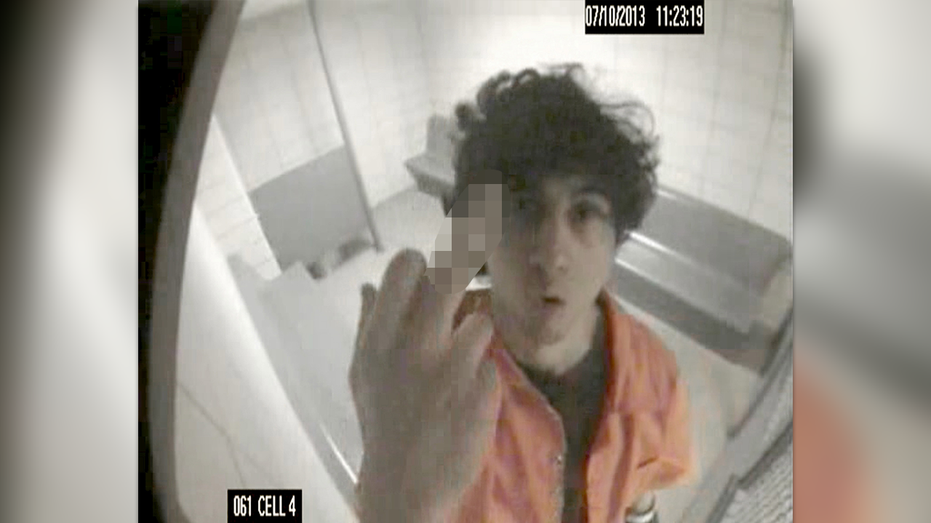President-elect Donald Trump has vowed to end the Biden-Harris administration’s moratorium on federal executions when he returns to office next year, putting 40 federal death row inmates on notice.
The U.S. government has executed 50 inmates since 1927, according to the Bureau of Prisons, including Oklahoma City bomber Timothy McVeigh and Cold War spies Julius and Ethel Rosenberg. That’s far fewer than the individual states, which have executed more than 1,500 condemned inmates in the last 50 years.
The government carried out death sentences for 13 federal prisoners during Trump’s first term, the most under any president in a century. Then President Biden declared a moratorium on federal executions after taking office in 2021.
Here are some of the high-profile offenders on death row in U.S. Bureau of Prisons custody:
BOSTON MARATHON BOMBER’S CASE THROWN BACK TO LOWER COURT
The surviving Boston Marathon bomber planted explosives at the running event along with his older brother Tamerlan, on April 15, 2013. They killed three people, including an 8-year-old, and injured hundreds more. Then they killed an MIT police officer named Sean Collier as they tried to escape.
Police shot and killed Tamerlan on April 18, 2013, and arrested Dzhokhar the following day when they found him hiding in a trailered boat.
He has not yet exhausted his appeals, and in March a federal appellate court threw his case down to a lower court to probe for juror bias.
His death sentence was thrown out by the U.S. 1st Circuit Court of Appeals in 2020 but later reinstated by the Supreme Court.
Now 31, Tsarnaev is being held at the maximum-security U.S. Penitentiary-Florence in Colorado.
SUPREME COURT DENIES APPEAL OF DYLANN ROOF, SENTENCED TO DEATH FOR MURDERS AT SC BLACK CHURCH
A White supremacist who barged into the Emanuel AME Church in South Carolina and opened fire, killing nine Black parishioners attending a Bible study in 2015.
Jurors took less than two hours to find him guilty on all counts.
Roof, who in 2017 was the first person sentenced to death for a federal hate crime, had a Supreme Court appeal denied in 2022. A lower court upheld his conviction the prior year.
Now 30, he is being held at the United States Penitentiary in Terre Haute, Indiana.
PHILADELPHIA DRUG KINGPIN CHARGED IN DOZEN MURDERS
Council spent a week at a motel across from the CresCom Bank in Conway, South Carolina, where he watched the movie “Get Rich or Die Tryin'” before he went in with a gun and killed two women who worked there, a 36-year-old teller named Kathryn Davis Skeen and 59-year-old Donna Major, the bank manager.
FBI AGENT SAYS BANK ROBBERY SUSPECT CONFESSED HE WOULD KILL
Council already had a prior felony conviction at the time and told an FBI agent that he went into the bank knowing he would kill someone during the robbery.
He had been on parole for a month at the time of the murders, which came during his second bank robbery since leaving prison.
He was sentenced to death in 2019. Now 39, he is on death row in Terre Haute.
FBI REPORTEDLY LET DEATH ROW INMATE HELP IN SEARCH FOR VICTIM’S REMAINS
Two career thieves who escaped a Kentucky jail in 2005 and went on a violent, interstate crime spree that included kidnapping, raping and killing two women, Samantha Burns, 19, and Alice Donovan, 44.
The two were on the run for 17 days. They killed Donovan in South Carolina and Burns in West Virginia.
They stole their first getaway vehicle in Indiana and tied its owner to a tree, leaving him alive. They conducted other thefts, robberies and carjackings before police recaptured them.
Fulks, 47, and Basham, 43, are both awaiting execution in Terre Haute.
Savage is a Philadelphia drug kingpin who ordered 12 murders, including an arson attack that killed six people.
He had his cronies set the fire for revenge on another cocaine trafficker named Eugene Coleman, who became an FBI informant.
Coleman wasn’t home. The blaze killed his mother, his 15-month-old son, three other children between 10 and 15 years old and one other adult.
Savage was also convicted of ordering or taking part in six other murders.
He is 49 years old and also being held in Florence.
Lawrence is a serial bank robber who killed a police officer named Bryan Hurst, 33, during an attempted stick-up in Columbus, Ohio, in 2005.
The gunman came into the bank and opened fire, striking Hurst, who was stationed inside the bank on a special assignment, just above the vest, according to the Officer Down Memorial Page.
Hurst, a Marine Corps veteran whose daughter was 6 months old at the time, returned fire, injuring Lawrence.
The suspect abandoned the robbery attempt and fled without hurting anyone else.
Lawrence, 49, is on death row in Terre Haute.
PITTSBURGH SYNAGOGUE SHOOTER ROBERT BOWERS TO BE SENTENCED TO DEATH
Bowers is the former truck driver who entered Pittsburgh’s Tree of Life Synaoggue in 2018 and fatally shot 11 Jewish worshipers.
Now 52, Bowers was initially charged under the first Trump administration and former Attorney General Bill Barr.
He received a death sentence in 2023, despite the Biden-Harris administration’s pause on executions. He is on death row in Terre Haute.
Another exception to Biden’s moratorium on death penalty cases is Payton Gendron, who stormed a supermarket in Buffalo, New York, in 2022 and killed 10 Black people in a hate-crime massacre that he livestreamed. While he is not on death row, Attorney General Merrick Garland announced in January that the Justice Department would seek the death penalty.
Trump has also vowed to expand the death penalty to other crimes, including child rape, human trafficking and drug trafficking.
The death penalty is reserved for the worst of the worst criminals. To make sure it isn’t arbitrarily imposed, courts follow a system that weighs aggravating factors against mitigating ones.
Most often, the death penalty is reserved for murderers, but it can also be imposed on spies, traitors and serious drug traffickers.
In many states, the murder of a police officer is already an aggravator considered at sentencing. Likewise, so is killing someone who is helpless, such as a child or elderly victim.
People convicted of drug offenses can sometimes be sentenced to death under federal law, especially if someone died in connection with their case, they had prior felony convictions, they exploit minors to traffic their drugs or sell them near schools.
The Associated Press contributed to this report.
























